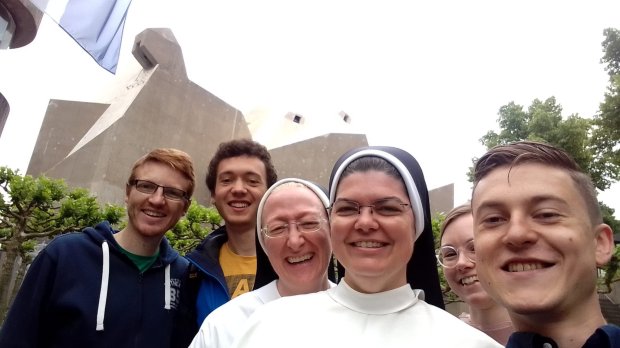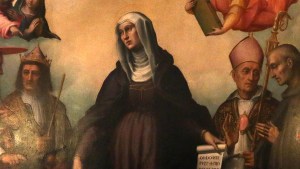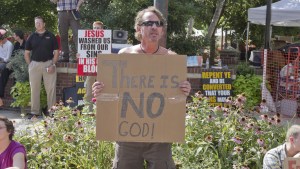The land of tulips, wooden shoes and windmills was also once a vital Catholic center of Europe. The Netherlands was so Catholic, in fact, that it was a major source of missionaries around the world.
Times have changed. Holland, as it’s known colloquially, today is one of the most highly secularized countries in a secularized Europe.
The Netherlands has gone from sending missionaries to being mission territory itself, and a small group of religious sisters from the United States are on the vanguard of the effort to revive the faith there.
Since 2014, residents of the southern Dutch city of Sittard have caught a glimpse of the black-and-white habit-clad Dominican Sisters of St. Cecilia from Nashville, Tennessee.
“When we first got here they told us the Netherlands used to be the number-one sending diocese of missionaries,” said Sister Mary Amata Mueller, one of three Nashville Dominicans now serving in Holland. “And now we’re needing missionaries to come back to us.”
The bishop who invited the sisters to Holland recognizes their missionary spirit and attributes their effectiveness to their courage and joy.
“They’re not afraid at all to go anywhere,” said Everard de Jong, auxiliary bishop of Roermond in the Netherlands. “They talk to people. They’re very open. They radiate joy and faith.”
Bishop de Jong first learned of the Dominican Sisters of Nashville when he was studying in Washington, D.C., and was inspired by their “radiance.” He was troubled by the dismal religious situation in his native land and sought ways to spark a “new evangelization,” a constant theme of Pope St. John Paul II, whose papacy had inspired him as a young priest.
Indeed, the numbers regarding religious belief and practice in the Netherlands in recent years have not been encouraging. Wikipedia says that almost all Christian groups in Holland have lost members. “In particular, the loss of members of the two major Churches is noticeable, namely the Roman Catholic Church in the Netherlands, with a membership loss of approximately 589,500 members between 2003 (4,532,000 people, or 27.9% of the population) and 2013 (3,943,000 people, or 23.3%), the online encyclopedia notes. “The number of Catholics is not only declining, but many people who identify themselves as Catholics also do not regularly attend Sunday Mass. 172,000 people, or 1% of the Dutch population, attend Mass on any given Sunday according to information by the Catholic Institute for Ecclesiastical Statistics (KASKI) in their 2010 statistical update of the Dutch Catholic Church.”
Granted, the stats are from 2010, but the Dutch Catholic Church is still struggling.
“Only 3% to 4% of Catholics go to church each Sunday, and there’s a great lack of knowledge of the faith among Catholics,” Bishop de Jong said in an interview.
Catholic culture
That’s not always readily apparent to visitors, who might notice the vestigial signs of a Catholic culture in the south of the country, where the Diocese of Roermond is located.
“In Limburg, the province where we live, there’s a very visible Catholicism,” said Sister Mary Amata. “For example, every little village has its own crucifix and a place where people can go pray. There’s someone who keeps a flame going by that crucifix in our village. There are little chapels all around. People do a lot of hiking and biking here, and they’ll stop at these little chapels and light a candle. But in a lot of cases that’s where it ends.”
Frank Hage, an attorney and the secretary of a foundation that supports the Dominican sisters in the Netherlands, added that most of the people who go to church are over 70.
“I’m 55, and I’m one of the youngest in the church,” Hage said in an interview. “Parents never go to church, and their children never go. Many churches in the Netherlands are closing.”
Spiritual Marshall Plan
Sister Mary Amata likened the spiritual landscape of Europe to the time just after World War II, when much of the continent lay in ruins and was depleted and exhausted.
“Bishop de Jong said that at the end of World War II, it was the Americans who came into this area,” said Sister Mary Amata, a native of Hartford, Connecticut. “He said it was a very dark time in our history, and they came and helped us. And now we also have a darkness in our land, and the Americans need to come and help. It was just the reality of how secularism can take over and there’s a darkness here, in terms of the faith, I think, because there have been generations now of people who have not received catechesis.”
But the situation has gotten so bad that some people are choosing not to have their children baptized, Sister Mary Amata observed.
“You have Catholics who still ask for the children to be baptized, but there’s such a disconnect from what it means to live the life of faith. There are those who still do it because ‘My grandmother wants me to do this, but I don’t believe in God,’” she summed up. “But they don’t go to church. So we’ll do baptismal preparation with a few lay people in our parish. We’ll go to their homes to prepare them for their child’s baptism. We get about an hour and a half with them. Some still have this sense: they know that God exists. There’s a faith there, but they haven’t been catechized enough. They get a few lessons for their first Communion and maybe a few more for confirmation, but that’s all the catechesis they get, and there’s not a sense of that ongoing formation and certainly not like a weekly Sunday school.
“So that generation, it’s not like they’re radical atheists, it’s like they never grew up in the faith, and they don’t believe in God,” she continued. “A lot say ‘I can’t believe in God because I believe in science.’ And there’s that split. Somewhere along the way they were told ‘You have to believe in one or the other.’ So when you’re teaching little kids who get this from their parents, you see this sense of relief like ‘Oh, I can believe in that, that God did the Big Bang. I can believe in Him.’”
“You’ll hear people here talk about [religion] as this must-do burden, without a relationship with God,” added Sister Mary Lucy Sundry, who is originally from Rochester, Minnesota.
But, Sister Mary Amata said, “there are some really good families who want the faith for their children, and there are these really small pockets all over the Netherlands of people who want catechesis, … but they feel so alone, I think.”
After Bishop de Jong got permission from the Dominicans’ leadership in Nashville in 2012, a small group of sisters headed across the pond to begin the process. The bishop and people like Frank Hage identified a former convent where the new arrivals could live and started raising money for necessary renovations and a long-term plan to support the sisters while they lived in Holland. The sisters themselves had to learn Dutch and work on getting residency permits and driver’s licenses. That very process put them into situations where they could evangelize – waiting in lines with other immigrants, some of whom came from Islamic cultures.
“It was like hidden evangelization,” said Sister Mary Amata.
“I think you’re received well that way because you’re on equal footing, all trying to adapt to a new country, new culture,” added Sister Mary Lucy.
It didn’t take long for the sisters to find other opportunities to engage in the New Evangelization. They work primarily in and around Sittard, a small town on the border of Germany and close to the border of Belgium. In Sittard and surrounding towns, the sisters teach in a variety of settings: giving catechesis to elementary school children preparing for First Communion and Confirmation at local schools; teaching as guest-speakers about religious life and their work in the Netherlands; giving catechesis to children at a weekly children’s club; hosting groups for Bible sharing and faith sharing for high school students, young adults, and young parents, as well as parish leaders.
They also tutor high school students in English and serve at the local high school in the English and honors program. The sisters help with the preparation of parents for their children’s Baptism, and they participate in committees for catechesis in Sittard as well as for the newly-forming Catholic school initiatives in the Netherlands. The sisters also host afternoon retreats for First Communion children, Confirmation students, and Days of Reflection for young adults. One sister is devoted to college campus ministry in Maastricht.
Authentic friendship
It was in Maastricht where Alessa Knur, 29, originally from Aachen, Germany, discovered the sisters. She was studying jazz at the local conservatory and was searching for a closer relationship with God. One evening after attending a very sparsely-attended Mass, she was reading a poster in the vestibule, announcing a pilgrimage to Rome. It was being organized by the Nashville Dominicans.
“A man standing nearby told me I should get to know the sisters, that they’re really very nice,” she said. She decided to go to Rome with them, and it was the beginning of a great relationship with the sisters, which has given her both a sense of community with other Catholics and other young people who are searching, and a growing relationship with God and a deepening of her faith.
“Their whole body is covered and you can just see the face, but you can look into the face and see that they are just so beautiful. Someone said to me, ‘Yes, it’s the love that makes them so beautiful.’ Its true. They are really loving people.”
Knur, who said she had been looking for “authentic friendship,” said the sisters “changed the way I could communicate with people. They were gathering a lot of young Catholics, and they really liked being around the sisters. I found a community there, and I also found spiritual food: answers to questions about God, questions about the faith.”
The Nashville Dominicans also participate in nationwide and diocese-wide events and initiatives for youth and young adults (such as the annual Catholic youth day, young religious events, and weekends for young adults and families).
American appeal
Hage, who noted that the sisters speak “very, very good Dutch,” first set out to make friends with people and “find out what drives people.”
“People want to know ‘What brings you to this?’” he said. “The sisters don’t need to talk about the faith because people want to talk with them about the faith. They think people in the Church are very old, but now they see three or four sisters who are young.
“And,” he added, “because they are American it’s very easy for them to come in contact with the youth.”
The American way of life, he explained, is very popular in the Netherlands. “Young people here look to American movies, and they like McDonald’s and Coca-Cola,” he said. “I thought this could be a way for our youth to meet in church in another way, because when young people think of church they think of something old fashioned and I have nothing to do with it.”
His own children, who are now 21, 20, and 18, have certainly been impressed with the American missionaries, he said.
“They used to go every Saturday morning to the convent and learn about the faith,” Hage said. “They learn about Church councils in the first centuries. They came home excited about it. Our kids have learned how to talk to other children about the faith and to defend themselves.”
Said Sister Mary Amata, “It was clear to us when we came to visit that the Holy Spirit wanted us to be here.”



